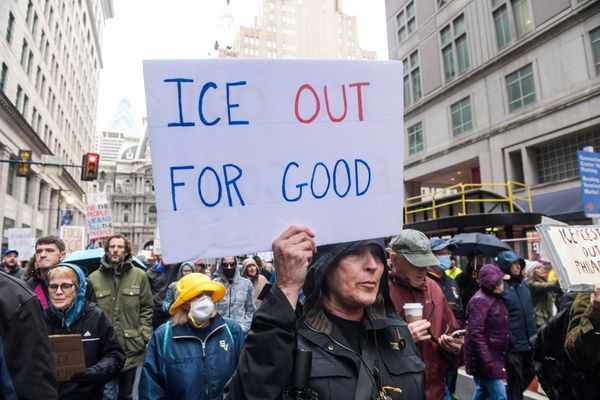Downing Street has set out its apparent intent to push ahead with a new trading regime for Northern Ireland whether or not the Democratic Unionist party backs the plan – although a leading Conservative Brexiter predicted they ultimately would.
A day after Rishi Sunak announced his “Windsor framework”, an attempt to patch the holes in Boris Johnson’s original post-Brexit protocol for Northern Ireland, a sense of elation among Conservatives was giving way to recognition that there was a long road ahead.
Even if the DUP and more sceptical Tory MPs decide they can live with a plan that has wrung significant concessions from Brussels but still leaves scope for EU law in Northern Ireland, full ratification is likely to take months.
Perhaps the key moment of the day came shortly after 8am, when the prime minister was quizzed about his deal on BBC Radio 4’s Today programme and asked whether it would be implemented even if the DUP declined to accept it.
Sunak replied: “The framework is what we have agreed with the European Union.”
On Tuesday evening, he continued his sales pitch to MPs with a speech to the 1922 Committee of Tory backbenchers. Speaking afterwards, Steve Baker, a leading Conservative voice on Brexit issues who is now a Northern Ireland minister, said the response had been positive.
“The prime minister is not going to be losing any votes on this,” Baker said. “Everybody realises this is as good as it is going to get.”
But with Sir Jeffrey Donaldson, the DUP leader, saying the party would examine the full legal text before deciding whether to accept the plan, Baker said Sunak accepted the need to take things slowly.
“People are clearly concerned about the DUP being willing to go back into power-sharing,” he said. “The prime minister was clear they need to be given time to talk all the issues through. This is a very difficult issue for them. I believe they will agree that this is a good deal.”
The European Research Group, which represents many backbench Tory Brexiters, has said it will convene a sub-group of MPs and others with legal backgrounds to go through the full text and locate any potential issues.
Donaldson said he had updated the ERG on the DUP’s stance on the Windsor framework. He did not dispute estimates from senior ERG sources that it would take one or two weeks to properly scrutinise all aspects of the deal.
“It’ll take as long as it takes,” said Donaldson. “We’ve listened very carefully to what the PM has said. And now we’re looking at the legal text, the political declaration, the command paper and we want to translate what it says against what the PM’s telling us and see what that means for Northern Ireland.”
While No 10 will be delighted with the initial reaction to the plan, they will also be aware that Johnson has yet to give a formal response.
The Times reported on Tuesday that allies of Johnson did not expect him to oppose the deal outright because “there is no rebellion”, and Johnson may absent himself from voting instead. Johnson can “see which way the wind is blowing”, the newspaper quoted one of his allies as saying.
David Frost, who helped negotiate the protocol, disputed Sunak’s claim that the deal means the UK has “now taken back control” because EU law “remains supreme”.
The Conservative peer conceded it contains improvements but argued it is only “slightly amended” so regulations from Brussels “bite less tightly”.
Writing in the Telegraph, Lord Frost said: “That is worth having, but it isn’t taking back control. Indeed, it may entrench the protocol superstructure rather than weaken it.
“That doesn’t mean the deal shouldn’t go ahead. It will help. But it won’t remove the underlying tensions, even if the DUP does decide to go back into Stormont.”
Sunak and his officials are keenly aware of the pitfalls ahead, not least over the inherent contradictions of hailing a plan that gives Northern Ireland greater trading advantages than elsewhere in the UK.
Speaking to a small gathering at a tightly managed “PM Connect” event at a Coca-Cola factory in Lisburn, south-west of Belfast, Sunak was effusive in his description of Northern Ireland’s “unique” and privileged economic position of largely unfettered trade in goods with both the EU and Great Britain.
“Nobody else has that,” Sunak told the audience. “No one – only you guys, only here.
“And that is the prize. I can tell you, when I go around the world and talk to businesses, they say: ‘That’s interesting.’ Nowhere else does that exist. It’s like the world’s most exciting economic zone.”
Such comments, which are likely to spark worries among some Brexiters that Sunak could be amenable to more generally open trading links with the EU, also prompted accusations from other critics that he was praising a situation that was ended for the rest of the UK by Brexit.
“The prime minister is boasting about the benefits of the single market and customs union for businesses in Northern Ireland, while denying those same benefits to businesses struggling in the rest of the UK with our current economic crisis,” said Stella Creasy, the Labour MP who chairs the Labour Movement for Europe.
Alyn Smith MP, the Scottish National party’s Europe spokesperson, said Sunak appeared to be “moonlighting as a remainer”.
Assuming the plan is not derailed by a mass rebellion, the timetable could nonetheless take months to ratify on both sides of the Channel with legislation needed in Brussels and London to amend the original withdrawal agreement.
The process of ratification will begin at a UK-EU joint committee next month but must be followed by new laws. The legislative route has yet to be set out by the government but it is expected to take the form of statutory instrument rather than primary legislation.
On the EU side, some of the new pact can be agreed at joint committee level but because the original treaty is being tweaked it will require approval by member states and official signoff by the European parliament.
Although the deal is more straightforward than the trade and cooperation agreement, sources say this process could take until the summer. Government sources say it could take a year to phase in.
Additional reporting by Aubrey Allegretti







